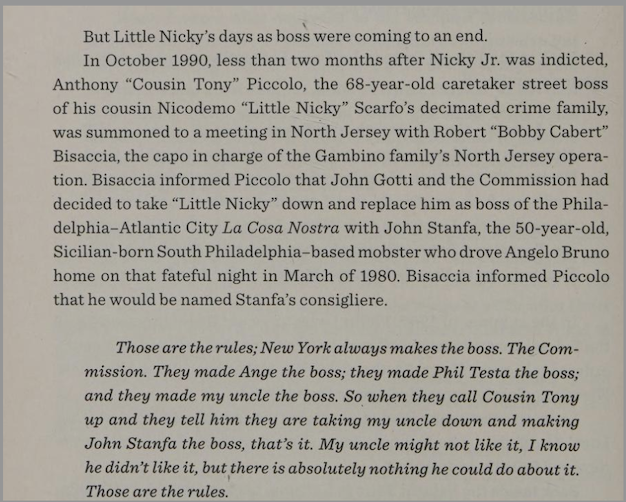NothingNew44 wrote: ↑Sat May 28, 2022 4:40 am
Chris Christie wrote: ↑Sat May 28, 2022 4:24 am
One thing to consider, imagine being around in 1985-1990 after the Commission has been in power for 55 years, I imagine many expected it to keep going as it had for 2 generations. It's not like it was ever formally disbanded, it was just that there was constant pressure from law enforcement and boss turnover increased more than it had at any time in history. From 1985 to 2005, bosses/acting bosses were lasting on average about 5 years.
These are great points. The associates coming up as made at that time had heard of this governing body for years. It was a foundational fabric of being in that life that the NY bosses comprised its membership. The natural inclination after the commission case itself is to assume and interpret the next leaders of the Families will pick up the pieces to carry on. So if you hear of bosses meeting your assumption is to consider that a commission meeting. Good stuff CC
Thanks. This brings us to the present argument of what qualifies as a Commission meeting. Do we only consider Formal Meetings involving all members of the Body as meetings or do we factor in one-off meets like the 2000 one? As previously mentioned, Gravano considered the 88 meeting to be a Commission meeting. I will pose the question to Michael DiLeonardo and introduce both sides of the argument to him and see what his take is.
This does bring me to the "Taking Over Cali" thread which had informants like Bomp considering Roselli the real boss of Cali because its bosses deferred to him while he was formally a soldier of Chicago. There are some who would probably chart that out as the 3 Cali bosses with a line going up to Roselli and then a line going above him to Chicago. This wouldn't be completely wrong but it wouldn't be completely right either as there was no formal decision made, Giancana never contacted California and said, "Ok, Bosses, you're going to report to my soldier John Roselli."
De Facto and De Jure. People have an interest in the de facto, they are fascinated by the idea of a "secret" or "real" bosses. To me, Roselli just serves as an indicator on how influential members can be without having to hold a formal office within the Organization. But the Sopranos really drove home this idea that the rules are just disregarded and who holds the power holds the power, positions be damned. While I agree the rules are broken I would argue fervently that they aren't overlooked. It's like running red lights, many do but they don't do it freely, they look and make sure no cops are around when they do it. So while running the red light is breaking the rule, the fact that you look before doing so shows that you know the rule is in place and that there are repercussions for breaking it if caught. Also, had the Sopranos S1 played out in real life and Junior sought permission to kill Soprano, had a sit went down with NY over it, out of rules, tradition and self-protection, NY would not side with Tony's "I made him boss but everything is ran by me." They would support Junior's claim that, "This is MY Family which I was elected boss of and my nephew is out of line and undermining my position."
